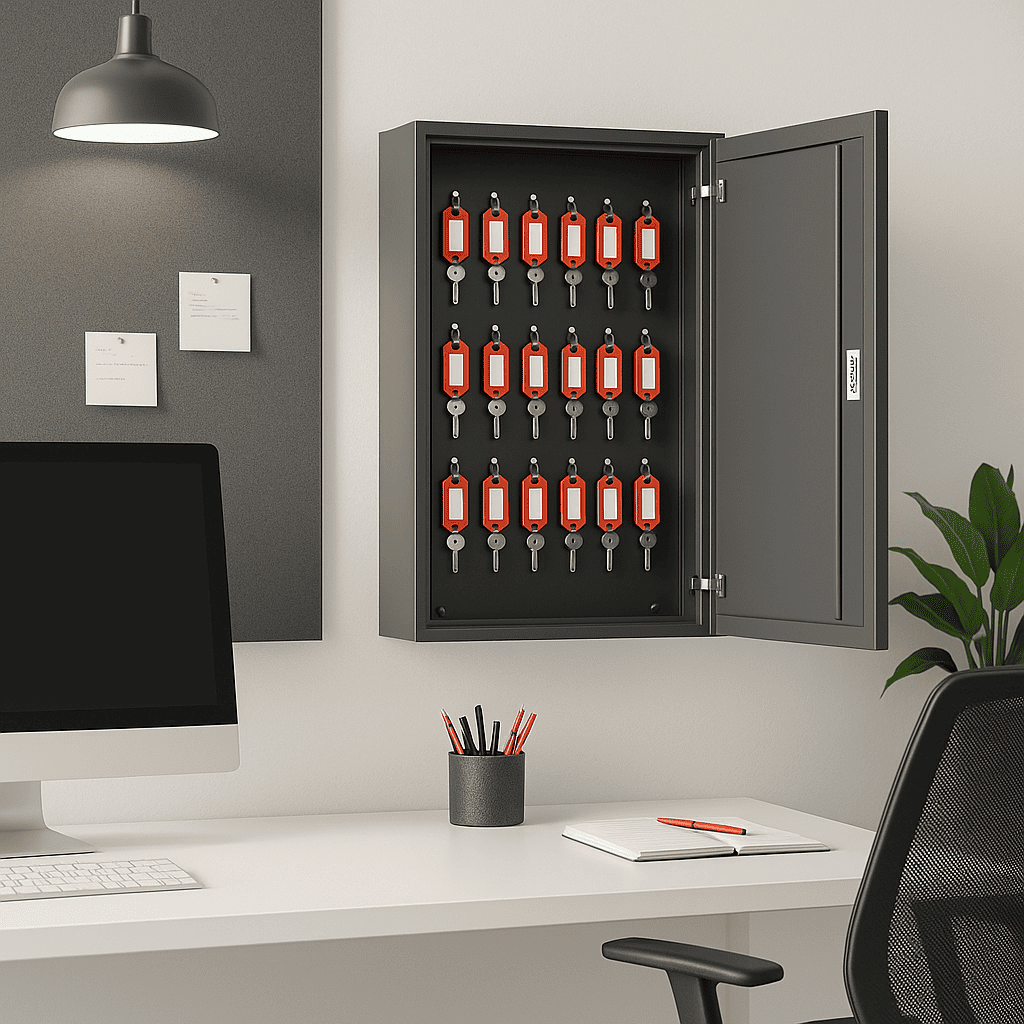
Wall Mounted Key Cabinets: Secure, Organised Key Storage for Home and Business
Imagine a busy family home outside Manchester or a growing business in Edinburgh with dozens of keys in circulation. Lost keys cost time, money, and sometimes even safety. For homeowners, landlords, tradespeople, or offices spanning multiple offices, keeping keys organised and secure is essential. Enter the wall-mounted key cabinet: a simple yet effective solution that blends efficiency with peace of mind.
These sturdy steel cabinets fix securely to a wall and store keys out of sight, under lock and key. They may appear modest in design, but their benefits are far-reaching. Firstly, they drastically reduce the risk of keys falling into wrong hands—unlike hiding a spare under a flowerpot or doormat, which not only invites theft but may also invalidate home insurance policies ﹘ insurance firms and police groups strongly advise against such practices ﹘ and emphasise the need for proper security solutions such as key cabinets or safes.
Businesses in sectors managing hundreds of keys—such as estate agents, car rental firms, or maintenance companies—view key cabinets as indispensable for control and efficiency. Many cabinets come with features tailored to specific needs: self-closing doors to prevent accidental access, separate numbered hooks or slots for different key types, and options for mechanical key locks or electronic keypads to limit access to authorised individuals only.
Security is another major advantage. Cabinets built with reinforced steel and deadbolt systems offer effective burglary resistance. Some are even independently tested and rated for enhanced protection, especially those branded under UK security standards ﹙cite﹂turn0search2﹂turn0search8﹙. Electronic versions add another layer of security by maintaining audit trails: records of who accessed keys, when, and returned them, reducing losses and ensuring accountability—important for businesses managing assets like vehicles, property or equipment.
Homeowners benefit from key cabinets too. For families requiring spare keys for cleaners, carers or neighbours, a small wall-mounted key cabinet offers a more secure alternative than unsafe, ad hoc methods. These cabinets usually hold several keys and, when installed discreetly indoors, give homeowners controlled yet convenient access without risking code exposure to passersby.
Navigating insurance implications is important. Some polices can be voided if keys are stolen from poorly secured storage. However, insurers tend to accept properly installed, certified key cabinets, especially those marked as “Police Preferred” or “LPCB-approved.” To benefit fully, homeowners and businesses should check with insurers to ensure compliance and coverage continuity.
From a convenience standpoint, key cabinets reduce the anxiety associated with misplacing keys. Losing keys often means hiring locksmiths and changing locks; a secured location ensures keys remain available and accounted for. Businesses avoid downtime and costs linked to misplaced keys, while homeowners enjoy the comfort of efficient, traceable key management.
Increasingly, advanced features are being integrated into key cabinets. Electronic access controls allow administrators to share temporary access codes or revoke permissions as needed, monitor key usage remotely, and track detailed logs. For organisations with evolving staffing or maintenance needs, this versatility is a game-changer.
Certified, well-installed key cabinets also foster a culture of responsibility. By emphasizing organised, secure key storage, landlords, business owners, and homeowners signal a commitment to safety and oversight, whether safeguarding client vehicles, staff areas, or family homes.
To illustrate how this works in reality: imagine a small property management company in Cardiff. With multiple flats under their care, they installed an electronic key cabinet in their office. Access was restricted to authorised personnel, and each action was logged. This prevented unauthorised entry, cut costs associated with lost keys, and reassured both tenants and insurers that access was safe and regulated.
Similarly, a busy rural veterinary practice in Sussex uses a wall-mounted cabinet to manage keys for pet taxis, outbuildings, and equipment sheds. Staff can access what they need using timed codes, while managers track returns and security. Should keys go missing, usage logs highlight when and who last accessed them—simplifying investigations and accountability.
Wall-mounted key cabinets offer a cost-effective, secure, and organised alternative to outdated storage methods. They suit any environment—from family homes to car dealerships, holiday lets to farm offices—reinforcing both security and operational integrity. By adopting recognised, accredited models and verifying insurance compliance, UK homeowners and businesses can protect property, people, and trust.
